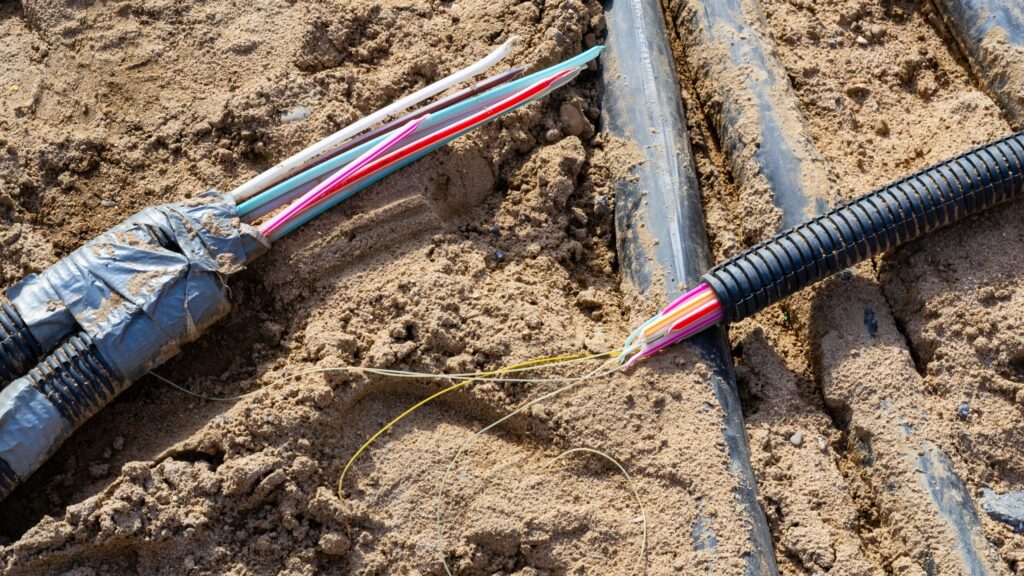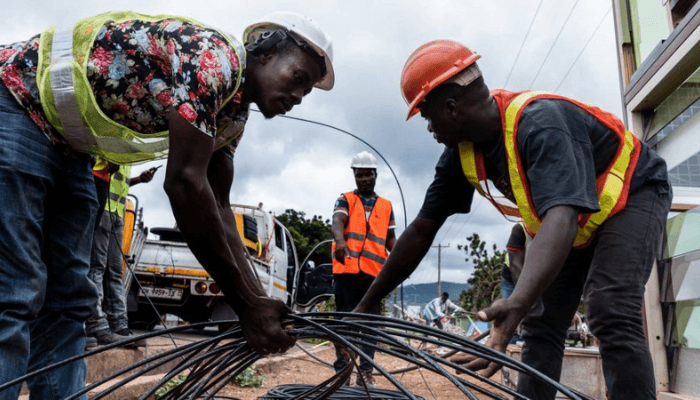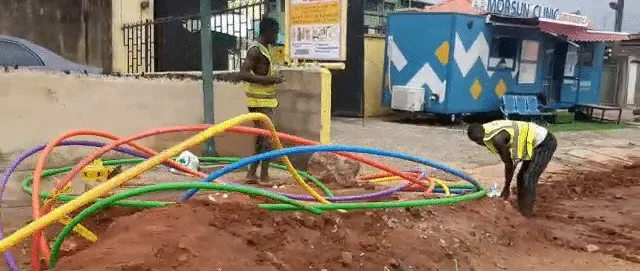MTN Nigeria is grappling with a dramatic rise in fibre-optic cable disruptions. From January through July 2025, the company recorded a staggering 5,478 fibre cuts, a surge largely fuelled by vandalism and expansive road-building activities. July alone saw 760 disturbances, while June stood out as the peak, with 1,016 incidents—the highest monthly total within the seven-month stretch.
These repeated hits to the nation’s telecommunications infrastructure are not just technical glitches. Service outages, data interruptions, and customer inconvenience have become regular, frustrating companions for MTN’s subscribers. A particularly severe case of vandalism, marked for repair on 24 August, knocked out connectivity at 101 sites spanning 15 local government areas across Kano, Adamawa, and Borno States. In its newsletter, MTN emphasised how such attacks force it to constantly rebuild, reroute, and restore network lines just to keep services going.

Table of Contents
Drivers of Disruption: Roadworks and Vandalism Lead the Charge
Digging deeper into the causes, MTN attributes over 60% of these fibre-optic cuts to road construction projects. As states race to develop infrastructure, road expansions frequently damage underground cables—even when proper coordination is lacking.
A striking example is Niger State, where Governor Umaru Bago has launched plans to develop over 556 km of new roads, part of a broader ambition to deliver 2,000 km in four years at cost north of ₦1.2 trillion. When asked about the cable damage, Suleiman Isah, Niger State’s Commissioner for Communications Technology and Digital Economy, remarked, “There is nothing we can do about it… Rather than digging the ground to lay fibre, we are providing our power lines for operators to use aerial technology.” His comments reflect a pragmatic response to recurring disruptions by prioritising aerial deployment in areas with active construction.
At the same time, vandalism remains a persistent and escalating problem. While nationality-wide data is scarce in this report, other industry sources underscore the severity. The Association of Licensed Telecommunications Operators of Nigeria (ALTON) has noted a recent spike, with operators now facing at least five vandalism attacks daily—more than double the rate before May 2025. The attack spectrum has expanded beyond cables and batteries to include transmission equipment and circuit boards, making vandalism far more sophisticated and costly.
NCC Sounds the Alarm: Industry Shoulders Strain of 1,100 Weekly Cuts
The Nigerian Communications Commission (NCC) has raised serious concerns over the scale and frequency of these disruptions. On 15 August, its Executive Vice Chairman Aminu Maida disclosed that the industry is now averaging 1,100 fibre-optic cable cuts per week.
Despite the introduction of Critical National Infrastructure (CNII) protections, the NCC maintains a collaborative stance. Maida affirmed that enforcement is a measure of last resort, preferring dialogue and mediation. Enforcement actions, he said, are only pursued when “all engagement and mediation avenues have been exhausted,” and are performed with the support of security, legal, and oversight bodies. His emphasis on preserving national communications integrity—rather than simply punishing offenders—is evident in this approach.

The Cost of Cuts: Economic, Operational, and Service Impacts
The ripple effects of frequent fibre-optic interruptions extend well beyond delayed downloads or dropped calls. Each incident carries significant economic and operational costs, not only to MTN but to the broader digital economy.
Though the TechCabal article doesn’t mention direct financial figures, other reports document the strain. For instance, between January 2024 and June 2025, MTN suffered over 13,700 fibre cut incidents, with around 9,000 in 2024 alone, and 4,700 in the first half of 2025. That same period officially saw MTN record an average of 145 cable-cut incidents daily.
The toll on MTN’s resources is immense. Repair costs, relocation efforts, and infrastructural restorations have driven the telco to redirect equipment originally earmarked for network expansion or upgrades—accelerating the exhaustion of annual maintenance budgets. One ALTON member remarks: “We fix it, they steal it”—a lament that encapsulates the frustration and financial drain facing operators.
These disruptions also ripple out to consumers, businesses, and public services. From halting banking transactions, slowing emergency services, frustrating subscribers, and stunting digital adoption, every fibre-optic cut undermines Nigeria’s digital transformation goals.
Looking Forward: Strengthening Resilience and Coordination is a Must
To safeguard connectivity and sustainable growth, coordinated action across sectors is essential.
Infrastructure coordination is vital. Roadwork authorities must inform telecom operators ahead of any digging. MTN’s Niger State solution—leveraging existing power-line routes for aerial deployment—is one example of adaptive thinking.
Security partnerships are equally important. The NCC’s reliance on collaboration, rather than unilateral enforcement, sets a constructive tone. ALTON has also called for coordinated national efforts involving security agencies, government offices, and civil society to reduce vandalism and protect telecom assets.
Technology solutions could offer breakthroughs. MTN recently began evaluating artificial intelligence systems—developed with Huawei—that can detect vibrations or tampering on fibre lines and promptly alert response teams. Such proactive monitoring could sharply reduce response times and prevent costly downtime.
Policy clarity remains critical. While CNII protections exist on paper, stronger enforcement mechanisms, compensation frameworks, and penalties for offenders would help deter both accidental and deliberate disruptions.

Conclusion
Between January and July 2025, MTN Nigeria recorded 5,478 fibre-optic cable cuts, with June being the most brutal month. Roadworks and vandalism stand as the twin culprits, while the NCC urges collective action over a crackdown to preserve Nigeria’s connectivity backbone.
As the digital economy deepens, uninterrupted service isn’t a luxury—it’s a necessity. Nigeria’s path forward hinges on better coordination between telecoms and infrastructure developers, smarter detection tech, stronger legal frameworks, and united efforts to police and protect telecom assets.
Join Our Social Media Channels:
WhatsApp: NaijaEyes
Facebook: NaijaEyes
Twitter: NaijaEyes
Instagram: NaijaEyes
TikTok: NaijaEyes




